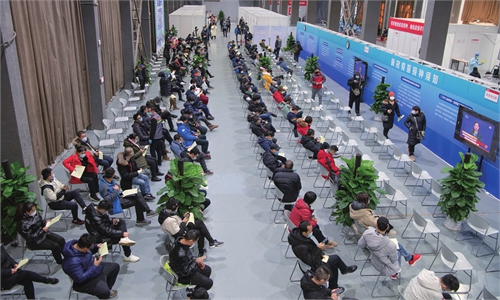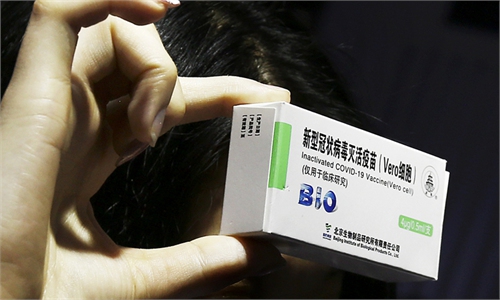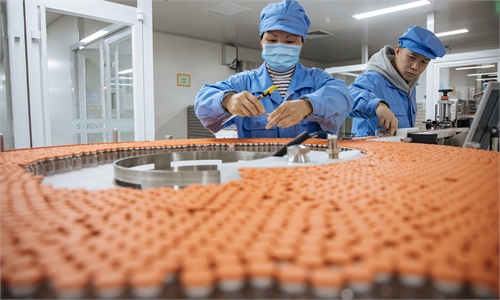Mass vaccination urged in China to avoid "immunity gap"
China moves to prevent ‘immunity gap’ with other countries
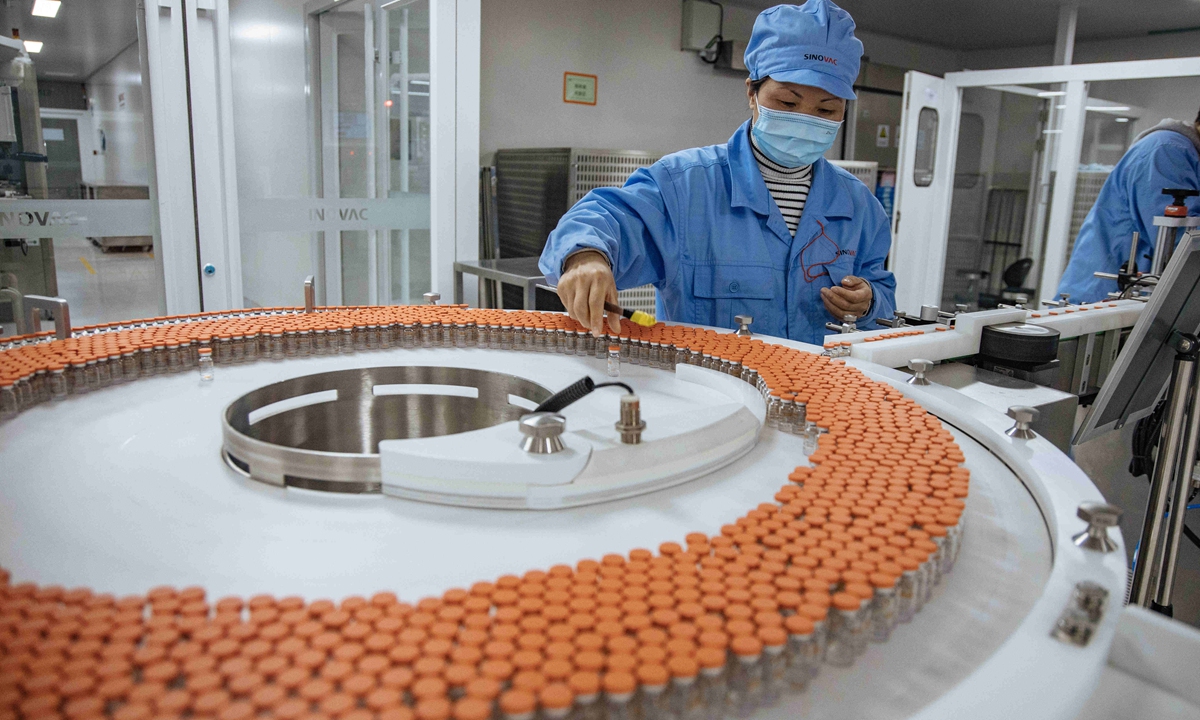
Sinovac vaccine photo
China's Sinovac's COVID-19 vaccine revealed on Thursday 78 percent efficacy rate and 100 percent protection against severe coronavirus infections in Phase III trials conducted in Brazil, bringing it closer to its domestic approval for the market and raises hopes for the second effective Chinese vaccine to be widely used, experts said.
The Brazilian Health Minister announced on Thursday the country would purchase 100 million doses of Sinovac's vaccine called CoronaVac for the Brazilian national immunity plan scheduled to start on January 25, following other developing countries, such as Indonesia, Malaysia and the United Arab Emirates, to secure Chinese inactivated vaccines in national inoculation.
As Europe, the US, and some Middle East countries speed up mass vaccination, observers are concerned that a mass inoculation race overseas may pressure Chinese herd immunity efforts against the coronavirus.
Chinese mass vaccination slow?
China's effective measures against the outbreak mean few people have contracted the virus and developed antibodies, while people in some Western countries quicky achieved herd immunity through either infections or vaccines. Such an "immunity gap" between the West and China would be epidemiologically and ecologically dangerous, Huang Yanzhong, a senior fellow for global health at the Council on Foreign Relations of the US, told the Global Times.
Though with less pressure in epidemic control, it is still urgent for China to speed up mass vaccination, experts warned, saying that the next six months would be a "golden period" to promote public immunity against the coronavirus.
As of Thursday, the top five countries with the highest percentage of their populations vaccinated against coronavirus are Israel, the UAE, Bahrain, the UK and the US, while China ranked 15th, according to data on the Our World in Data, a global data-recording platform developed by Oxford University.
But in terms of the total number of doses being used, China is now in second place (4.5 million doses as of December 31, 2020), only behind the US (5.92 million).
Sinopharm on Thursday announced that more than 4 million doses of its inactivated vaccine had been administered in China as of Monday, and more than 10 million doses had been distributed across national vaccination sites. No serious adverse reactions have been reported so far.
Other vaccine candidates, including those produced by Sinovac and CanSino, have also been taken for emergency use in China, and the overall doses given should have reached over 5 million, a Beijing-based immunological professor who prefers not to be named said.
"China has no slowdown in regard to both the emergency vaccination schedule and orderly arrangement," Feng Duojia, president of the China Vaccine Industry Association, told the Global Times on Friday. "We are not in a race with Western countries over the speed of mass inoculation or in vaccine technology. We are in a race with the deadly virus."
"It is quite normal to see different vaccination speeds given the distinct needs and urgency in various countries. Data opacity is also a factor that leads to public hesitancy for vaccines. Cross-national vaccine deals also require more specific indicators to be revealed such as adverse reactions for various demographics," Zhuang Shilihe, a doctor who has long been concerned with vaccines, told the Global Times.
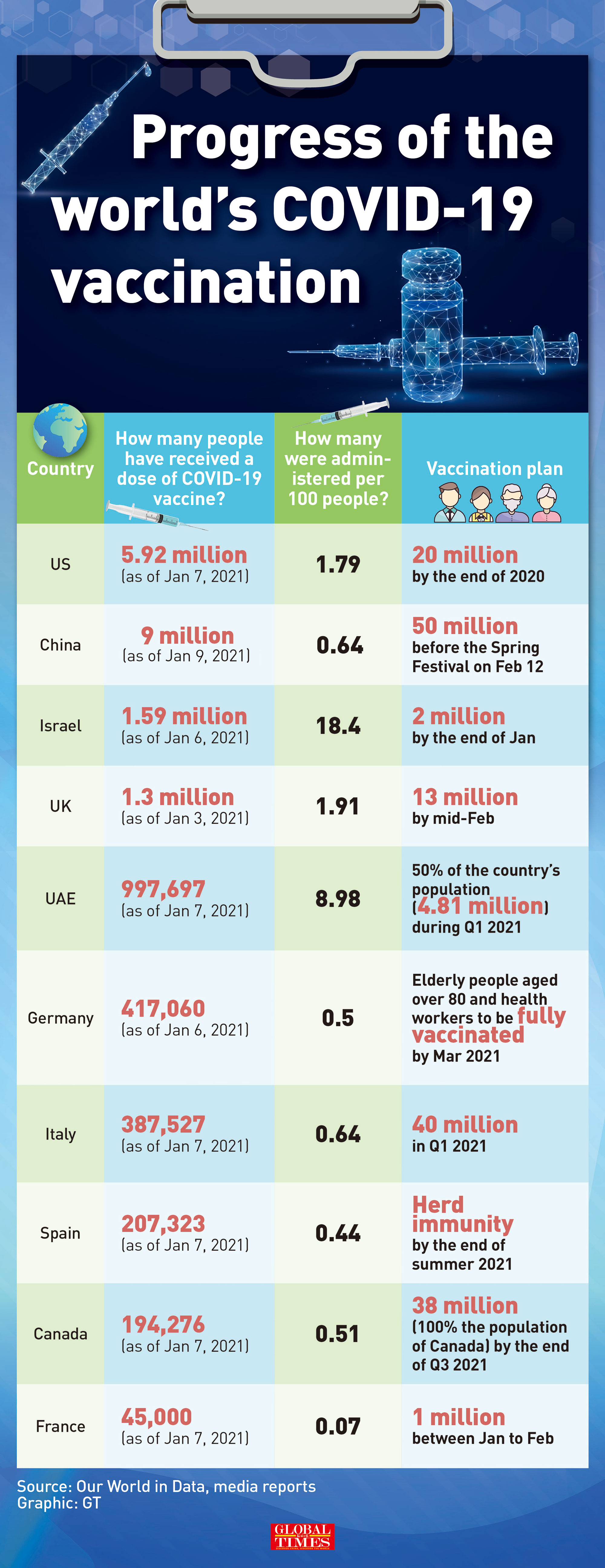
Progress of the world's COVID-19 vaccination Infographic: GT
Measures to prevent 'immunity gap'
If other countries are the first to achieve mass vaccination and resume the flow of people, whereas China still requires a two-week entry quarantine, it will affect the Chinese economy and people exchanges, said Chen Xi, an assistant professor of public health at Yale University, who fears an "immunity gap" between China and the West.
Given that the vaccine is still effective against the virus, China should accelerate vaccination speed to earn time for coping with potential virus mutations, Chen told the Global Times.
To narrow the immunity gap, some experts suggest China should prioritize its domestic vaccine needs and beef up public willingness for a dose.
Chinese health officials confirmed that China is projected to manufacture at least 1 billion doses of inactivated vaccine in 2021, in addition to Sinopharm's capacity of 120 million doses by 2020.
Given that each person needs two shots, the vaccine package can protect 805 million people - around 58 percent of the Chinese population - by the end of 2021, if all vaccines are used only for the domestic market.
It still falls short of China's aim to achieve a 75 percent inoculation rate.
The vaccines that China wishes to import through the COVAX Facility, a WHO-coordinated pooled procurement mechanism, can only satisfy 1 percent of its population, or 15 million people, according to the Chinese Foreign Ministry.
Analysts suggested that another way is to import vaccines developed by other countries such as Germany or Russia to fill the gap.
Chinese pharmaceutical company Fosun has announced it would import 100 million doses of the BioNTech vaccine if the vaccine receives approval.
Fosun Pharma launched Phase II clinical trials of the vaccine in East China's Jiangsu Province, recruiting 960 volunteers, and will submit its data, combined with its Phase III data in oversea trials, to the Chinese drug regulator and to apply for a market approval in China, a Fosun source told the Global Times.
The anonymous expert said that because mRNA technology is not as mature as inactivated vaccines in terms of manufacturing equipment and capacity in China, China's immunization plan still mainly relies on domestic vaccines.
China should consider balancing the vaccine's domestic needs and overseas promises, to secure more doses for the domestic market such as exporting only vaccine pulp to overseas partners to save domestic manufacturing lines and packaging materials, according to Huang.
Domestically, Huang advised Chinese government for a "free, but mandatory" vaccination strategy, which China has previously used in expanded immunization programs that eventually achieved vaccine coverage rates of over 90 percent.
Public education and communication is also required to increase public trust in vaccines and encourage more people to get vaccinated, Feng told the Global Times.
Some regions in China have launched a communication campaign on COVID-19 vaccines, like banners on main roads to encourage more injections.
Sinovac's conclusive efficacy data at 78 percent boosts global confidence in Chinese-developed vaccines, analysts said, especially for developing countries who see Chinese vaccines as a viable choice to end the pandemic.
Sinovac's trials in Brazil cover the volunteer groups aged over 60, which makes it more prominent compared with other candidates across the world, Zhuang told the Global Times on Friday.
Countries including Brazil, Indonesia and Turkey have purchased Sinovac's vaccine for their national immunization plans.
However, Brazilian microbiologist Natalia Pasternak told the Global Times on Friday that it is important to disclose more data in the placebo-controlled trials.
"The data points to a good vaccine, with the potential to prevent disease and death, and this is the most important. Nonetheless, it is also important to be thorough and transparent when communicating the data, lest we give way to speculation and conspiracy theories," said Pasternak.
